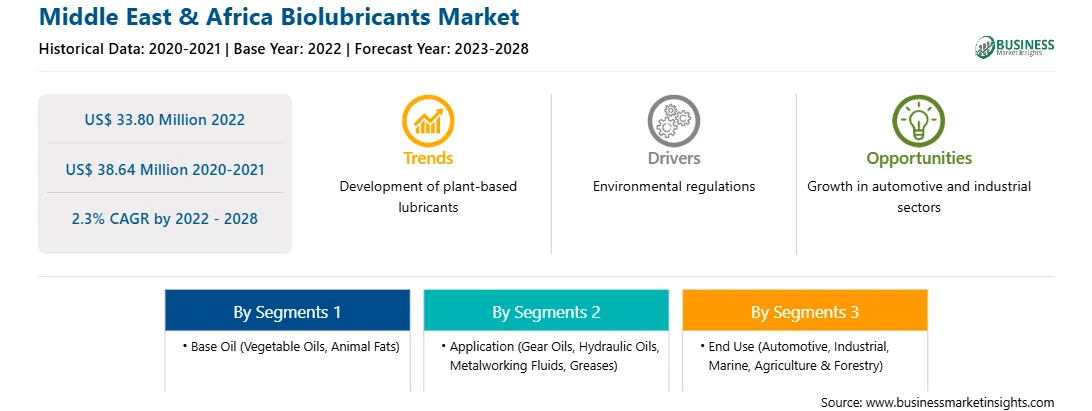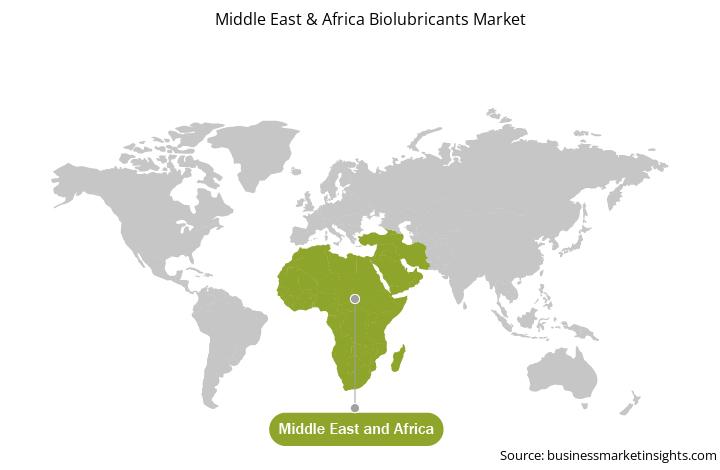The Middle East & Africa biolubricants market is expected to grow from US$ 33.80 million in 2022 to US$ 38.64 million by 2028. It is estimated to register a CAGR of 2.3% from 2022 to 2028.
Rising Research and Development to Enhance Performance of Biolubricants Drives Middle East & Africa Biolubricants Market
Compared to mineral oils, biolubricants show a significant degree of biodegradability, a lower amount of toxicity, higher viscosity indices, higher flash points, and better adherence to metal; however, they suffer from lower pour points and oxidative stability. The increasing attention toward sustainability and environmental concerns has driven the substitution of mineral oils with biolubricants. Research & development is being done on biolubricants for effective lubrication with superior tribological performance under a wide range of operating conditions and contact geometries. To take advantage of the high viscosities, biodegradability, and flash points, much of the research has attempted to improve the weaknesses of the vegetable oil base, i.e., the thermal and oxidative stabilities through chemical modification or additives. The inherent unsaturation in plant oils makes them perform poorly in extreme temperatures. To overcome this, chemical modification such as epoxidation of the double bonds has been used. Most additives are common in mineral and plant oils. However, due to the toxicity of currently used additives, research is required to develop and use alternate bio-based additives. Sensitive environments such as marine and forestry and the push for safe and sustainable lubricants drive research & development for improved bio-based lubricants. Various manufacturers are launching products made from recovered raw materials, which helps them reduce raw material costs. In October 2019, NextChem, a Maire Tecnimont subsidiary, launched a project with SO.G.I.S. for the recovery of residual fats to produce oleic acid, an intermediate product used for biolubricants production. These biolubricants are suitable to be used in naval transport due to their biodegradability and biocompatibility and suitable to be used in severe environmental conditions, such as in aeronautical systems, due to their fluid dynamic properties at low and very low temperatures. Thus, launching such innovative projects and increased research & development to enhance the performance of biolubricants would boost the Middle East and Africa biolubricants market growth over the coming years.
Middle East & Africa Biolubricants Market Overview
The Middle East & Africa biolubricants market growth is attributed to the high demand for biolubricants from industries such as oil & gas, automotive, and marine. The growing automotive sales in South Africa and Saudi Arabia are creating a significant demand for biolubricants. Biolubricants are used in manufacturing different vehicle components. Further, the strong presence of the oil & gas sector in Middle Eastern countries, such as Saudi Arabia, Iraq, the UAE, Iran, and Kuwait, creates a huge demand for biolubricants. The biolubricants market is also driven by local regulations in the region, which helps reduce carbon emissions by lowering the greenhouse effect. The demand for vehicles made in the Middle East & Africa is growing consistently. These biolubricants offer outstanding performance, increase machine life, and lower maintenance costs. Rising middle-class income, increasing population, and the total increase in passenger vehicle production are among the other factors driving the biolubricants market in the region.
Middle East & Africa Biolubricants Market Revenue and Forecast to 2028 (US$ Million)
Strategic insights for the Middle East & Africa Biolubricants provides data-driven analysis of the industry landscape, including current trends, key players, and regional nuances. These insights offer actionable recommendations, enabling readers to differentiate themselves from competitors by identifying untapped segments or developing unique value propositions. Leveraging data analytics, these insights help industry players anticipate the market shifts, whether investors, manufacturers, or other stakeholders. A future-oriented perspective is essential, helping stakeholders anticipate market shifts and position themselves for long-term success in this dynamic region. Ultimately, effective strategic insights empower readers to make informed decisions that drive profitability and achieve their business objectives within the market. The geographic scope of the Middle East & Africa Biolubricants refers to the specific areas in which a business operates and competes. Understanding local distinctions, such as diverse consumer preferences (e.g., demand for specific plug types or battery backup durations), varying economic conditions, and regulatory environments, is crucial for tailoring strategies to specific markets. Businesses can expand their reach by identifying underserved areas or adapting their offerings to meet local demands. A clear market focus allows for more effective resource allocation, targeted marketing campaigns, and better positioning against local competitors, ultimately driving growth in those targeted areas.
Middle East & Africa Biolubricants Strategic Insights

Middle East & Africa Biolubricants Report Scope
Report Attribute
Details
Market size in 2022
US$ 33.80 Million
Market Size by 2028
US$ 38.64 Million
Global CAGR (2022 - 2028)
2.3%
Historical Data
2020-2021
Forecast period
2023-2028
Segments Covered
By Base Oil
By Application
By End Use
Regions and Countries Covered
Middle East and Africa
Market leaders and key company profiles
Middle East & Africa Biolubricants Regional Insights

Middle East & Africa Biolubricants Market Segmentation
The Middle East & Africa biolubricants market is divided into base oil, application, end use, and country.
Based on base oil, the Middle East & Africa biolubricants market is segmented into vegetable oils, animal fats, and others. The vegetable oils segment held the largest Middle East & Africa biolubricants market share in 2022.
Based on application, the Middle East & Africa biolubricants market is segmented into gear oils, hydraulic oils, metalworking fluids, greases, and others. The hydraulic oils segment held the largest Middle East & Africa biolubricants market share in 2022.
Based on end use, the Middle East & Africa biolubricants market is segmented into automotive, industrial, marine, agriculture & forestry, and others. The industrial segment held the largest Middle East & Africa biolubricants market share in 2022.
Based on country, the Middle East & Africa biolubricants market is segmented into South Africa, Saudi Arabia, the UAE, and the Rest of Middle East & Africa. Saudi Arabia dominated the Middle East & Africa biolubricants market in 2022.
Carl Bechem GmbH, Fuchs Petrolub SE, Kluber Lubrication GmbH & Co KG, Shell Plc, and TotalEnergies SE are among the leading companies operating in the Middle East & Africa biolubricants market.
The Middle East & Africa Biolubricants Market is valued at US$ 33.80 Million in 2022, it is projected to reach US$ 38.64 Million by 2028.
As per our report Middle East & Africa Biolubricants Market, the market size is valued at US$ 33.80 Million in 2022, projecting it to reach US$ 38.64 Million by 2028. This translates to a CAGR of approximately 2.3% during the forecast period.
The Middle East & Africa Biolubricants Market report typically cover these key segments-
The historic period, base year, and forecast period can vary slightly depending on the specific market research report. However, for the Middle East & Africa Biolubricants Market report:
The Middle East & Africa Biolubricants Market is populated by several key players, each contributing to its growth and innovation. Some of the major players include:
The Middle East & Africa Biolubricants Market report is valuable for diverse stakeholders, including:
Essentially, anyone involved in or considering involvement in the Middle East & Africa Biolubricants Market value chain can benefit from the information contained in a comprehensive market report.